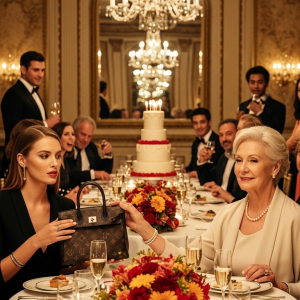The Sterling family mansion was a monument to old money, and on Thanksgiving, it was at its most intimidatingly beautiful. A fire roared in a fireplace large enough for a man to stand in, casting a flickering glow on the oil portraits of stern-faced ancestors. The long mahogany dining table was laden with a feast fit for royalty, every dish perfectly prepared, every wine glass gleaming under the light of crystal chandeliers. Yet, for all its warmth, the room was cold.
Anna Sterling felt the chill deep in her bones. To her family, she was a recurring disappointment. While her older brother, Mark, was the celebrated heir apparent—a ruthless, brilliant Harvard MBA who had tripled the company’s profits—Anna was the quiet, artistic soul who had dropped out of business school to work with non-profits. They saw her compassion as a weakness, her empathy as a fatal flaw in the Sterling DNA.
The dinner conversation was a relentless parade of Mark’s recent triumphs. He held court, his voice booming with the easy confidence of a man who had never been told no.
“The board was hesitant about the new acquisition, of course,” Mark was saying, flashing a predatory smile. “They’re old-timers, afraid of bold moves. But I showed them the numbers. You have to be willing to trim the fat to grow, Father. It’s simple economics.”
Her father, Richard Sterling, a man whose approval Mark craved and Anna had long given up on, nodded sagely. “Good. Decisiveness. That’s what this company needs.”
The conversation turned to Anna, and the mood shifted from celebration to condescension. “And Anna,” her mother said, her voice dripping with practiced disappointment. “Still working with that little soup kitchen of yours?”
“It’s a community outreach program, Mother,” Anna said softly, pushing a piece of turkey around her plate. “We’re trying to secure a grant to provide job training…”
Mark let out a short, derisive laugh. “Still trying to save the world with bake sales and good intentions, little sister? It’s cute. But in the real world, you can’t run a balance sheet on ‘good feelings.’ You’d run this family into the ground in a week.”
The table chuckled politely. The words, meant to be a casual jab, landed like a physical blow. Humiliation burned hot in Anna’s cheeks. She looked around the table at the faces of her family—her ambitious brother, her approving father, her socially obsessed mother—and realized she was utterly alone. She didn’t belong here.
Without a word, she stood up. The scraping of her chair legs on the polished floor was the only sound.
“Anna, where are you going?” her mother demanded, scandalized.
“I’m not feeling well,” Anna lied, her voice barely a whisper. “Please, enjoy the rest of the meal.” She turned and walked out of the opulent dining room, leaving her full, untouched plate of food on the table—a silent testament to her rejection
The cold November air was a shock after the stuffy heat of the mansion. Anna wrapped her thin coat around herself, the biting wind a welcome distraction from the sting of her brother’s words. She had driven only a few blocks when a wave of anger and sorrow washed over her, forcing her to pull over. Why did she even try?
She was about to drive on when she noticed him. A man, huddled in the recessed doorway of a closed shop, his frame thin and shivering under a threadbare blanket. His face was obscured by the shadows and a thick, unkempt beard, but the desperation of his posture was unmistakable.
A thought struck her. She looked at the passenger seat, where the catering staff, out of habit, had placed a perfectly prepared plate of Thanksgiving dinner for her to take home. Turkey, stuffing, mashed potatoes, cranberry sauce—the feast she couldn’t stomach in that cold, gilded cage.
On impulse, Anna grabbed the plate, got out of her car, and walked towards the man. He flinched as she approached, his eyes wary, accustomed to being chased away.
“Excuse me,” Anna said gently. “I was just leaving a… dinner. I’m not hungry, and this is going to go to waste. Would you like it?”
The man looked from her face to the plate, his eyes widening in disbelief. He gave a slow, hesitant nod. Anna handed him the plate and a plastic fork. She expected him to devour it immediately, but he simply held it for a moment, inhaling the aroma as if it were a memory.
She stood awkwardly for a moment, then turned to leave.
“Wait,” a voice rasped behind her. It was surprisingly strong, clear, and educated. She turned back. The man had taken a few bites, but he was now looking at her, and for the first time, she saw his eyes. They were a startlingly bright blue, sharp and intelligent, and they seemed to see right through her.
“That was a kindness you didn’t have to offer,” he said, his gaze intense. “In this world, a true act of kindness deserves to be repaid. So, let me offer you a warning in return.”
Anna was taken aback. “A warning?”
“Yes,” the man said, his voice dropping. “Do not, under any circumstances, sign any papers your brother gives you tomorrow. No matter what he says, no matter how simple he makes it sound. Do not sign.”
The specificity of the warning sent a shiver down her spine. “How could you possibly know…?”
The man reached into his tattered coat and pulled out a small, impossibly elegant object: a tarnished silver business card case. He flicked it open with a practiced thumb. Inside, nestled against faded silk, was a single, pristine card. He handed it to her.
Anna’s hands trembled as she read the embossed letters under the dim streetlight. Arthur Sterling, Co-Founder, Sterling Industries.
Her breath caught in her throat. Uncle Arthur. The family ghost. The brilliant, idealistic brother her father had exiled from the company decades ago. The man they said had “lost his mind” and “vanished.”
“They never told you the truth, did they?” Arthur said, a sad smile touching his lips. “My brother and I built that company on a foundation of quality and integrity. He, and now his son, have been chipping away at that foundation for years. Now, Mark is about to shatter it completely.”
He leaned forward, his blue eyes locking onto hers. “There is a man on the board of directors, a man who still believes in what we started. His name is George Albright. Find him. Tell him this, and only this: ‘The foundation is cracked.’ He will know what it means, and he will tell you the truth. Now go. Your brother is more dangerous than you know.”
Anna drove home in a daze, the impossible encounter playing over and over in her mind. Arthur Sterling. Alive. Living on the streets, watching them. The silver card felt heavy and real in her hand, a tangible link to a past her family had tried to erase. Could it be true? Or was this some elaborate, cruel trick?
She spent a sleepless night, the warning echoing in her thoughts. A lifetime of conditioning told her to trust Mark, the golden son, the pillar of the family. But her uncle’s eyes, filled with a sharp, desperate clarity, had felt more honest than anything she had heard at the Thanksgiving table.
The next morning, as if on cue, Mark arrived at her apartment. He was all charm and brotherly affection, a stark contrast to his dismissive cruelty the night before. He carried a sleek leather portfolio.
“Morning, Anna,” he said, breezing past her into the living room. “Brought you some coffee. Listen, sorry about last night. I was an ass. You know how it is with Dad, I’m always under pressure to perform.”
He opened his portfolio on her coffee table. “I just need you to sign a few things. It’s just some routine updates to the family trust, estate planning stuff. Dad wants all our affairs in order before the end of the year. It’s a formality, really.”
He pushed a thick document and a pen towards her. The pages were dense with impenetrable legalese. A few months ago, she would have signed without a second thought, eager for a scrap of his approval. But her uncle’s words were a shield around her.
“I don’t think so,” Anna said, her voice surprisingly firm.
Mark’s smile faltered. “What? Anna, don’t be difficult. It’s just paperwork. It will take you two seconds.” He was already impatient, the charming facade cracking. This was the foreshadowing she now saw clearly—his unnatural haste.
“I’d like my lawyer to look it over first,” she stated, crossing her arms.
Mark’s face hardened, his eyes turning cold. “A lawyer? For a family trust update? Don’t be absurd. You don’t trust me?”
“It’s not a matter of trust, Mark,” she replied, her heart pounding. “It’s a matter of prudence. I’m not signing anything today.”
For a moment, she saw a flash of pure fury in his eyes, so venomous it startled her. He quickly masked it, snatching the papers back. “Fine. Be difficult. But Dad won’t be happy about this.” He stormed out, slamming the door behind him.
The moment he was gone, Anna scrambled for her laptop. She found the board of directors on the Sterling Industries website. There he was: George Albright. With a trembling hand, she dialed the number listed. His executive assistant answered.
“Mr. Albright’s office.”
“My name is Anna Sterling,” she said, her voice tight. “I need to speak with him urgently. It’s a personal matter.”
She was put on hold for what felt like an eternity. Finally, a deep, gravelly voice came on the line. “This is George Albright.”
Anna took a deep breath. “Mr. Albright… I was told to give you a message. The foundation is cracked.”
There was a sharp intake of breath on the other end of the line, followed by a heavy silence. “My God,” Albright finally whispered. “He’s alive. He found you. Where can you meet? We need to talk. Now. Your family’s entire legacy is at stake.”
An hour later, in a quiet, private corner of a downtown hotel lobby, George Albright, a kind-faced man in his late sixties with weary eyes, laid out the entire, horrifying truth. The “trust update” was a cleverly disguised transfer of proxy voting rights for her substantial block of company shares. Mark was orchestrating a hostile takeover of a rival corporation, financed by leveraging the company to its absolute limit.
The deal was poison. It would line Mark’s pockets with hundreds of millions, but to service the massive debt, he would have to carve up Sterling Industries, shuttering historic divisions and laying off nearly a third of their workforce—thousands of people.
“Your father is against the deal, but he’s old and tired,” Albright explained, his voice grave. “Mark has swayed half the board with promises of a massive short-term payout. He just needs one more block of shares to have a controlling majority. He needs yours, Anna. Your signature was the final key to his plan to gut the company your father and uncle built.”
The Sterling Industries boardroom was on the top floor, a cathedral of glass and steel overlooking the city. It was a place of immense power, and today, the air crackled with tension. Mark Sterling stood at the head of the long, polished table, radiating confidence. He was about to present the deal of a lifetime, the one that would cement his legacy.
He launched into his presentation, his voice smooth and persuasive. He spoke of synergy, of market dominance, of shareholder value. The numbers he presented were dazzling, promising an unprecedented return on investment. The faction of the board he had already won over nodded along, their faces greedy with anticipation. His father looked tired, uneasy, but seemingly resigned.
“And so,” Mark concluded with a flourish, “with the board’s approval, which I am confident we have, we will move forward, securing the future of Sterling Industries for a new generation.” He smiled, ready to call the vote that would hand him the crown.
“Not so fast, Mark.”
The voice was quiet, but it cut through the room like a shard of ice. Every head turned towards the doorway. Anna Sterling stood there, dressed in a simple but elegant business suit. She was no longer the timid, apologetic sister. Her eyes were clear, her posture was straight, and she radiated an authority no one in that room had ever seen from her before.
Mark’s face went pale with shock. “Anna? What in the world are you doing here? This is a closed board meeting.”
“I’m aware,” she said, walking calmly to an empty chair next to George Albright. “But as a significant shareholder whose signature you tried to fraudulently obtain yesterday, I believe I have a right to be heard.”
A wave of murmurs swept through the room. Her father stared at her, his mouth agape.
Anna placed her hands on the table. “I have reviewed your proposal, Mark. A proposal you tried to hide from me, and whose true cost you are hiding from this board. You speak of shareholder value, but you have failed to mention the 2,000 employees whose jobs will be terminated to service the debt you intend to take on.”
She turned her gaze to the entire board. “You also failed to provide a full and transparent accounting of the company’s current liabilities, which, according to my sources, have been deliberately understated to make this reckless merger seem viable.”
Mark leaped to his feet, his face contorted with rage. “This is outrageous! She doesn’t know what she’s talking about! She’s a charity worker, not a businesswoman!”
“She is a Sterling,” George Albright said, his voice booming with authority. “And she is right. On behalf of her shares, and the shares of those of us who believe in the true foundation of this company, I am voting no on this merger.”
Anna locked eyes with her brother. “And I am not just voting no. I am formally making a motion, using my full voting rights as a primary shareholder, to table this merger indefinitely. Furthermore, I propose an immediate, independent forensic audit of the company’s finances and all of the Chief Operating Officer’s recent dealings.”
It was a coup. Mark’s meticulously constructed plan crumbled to dust in a matter of seconds. Albright immediately seconded the motion. Other board members, spooked by the words “forensic audit,” quickly joined them. The vote was a landslide.
Mark stood there, speechless, his face ashen. The golden boy, the celebrated heir, had been publicly and humiliatingly dethroned. And the executioner was the one person in the world he had never, ever seen as a threat.
The destruction of Mark Sterling was swift and absolute. The forensic audit was a bloodbath, uncovering a web of deceit, cooked books, and secret accounts Mark had set up in anticipation of his payday. He was fired in disgrace by the board—his own father casting the deciding vote, his face a mask of grief and shame. The SEC launched a formal investigation, and criminal charges were soon to follow. The family name was dragged through the mud, the scandal making headlines in every major financial journal.
In the midst of the chaos, a new leader began to emerge. Anna, with the steadfast guidance of George Albright and the quiet, wise counsel of her uncle, became the unexpected anchor. The board, desperate to restore integrity, saw in her the one thing the company desperately needed: a Sterling they could trust. They offered her an interim position on the executive committee.
She met Arthur not on a frozen street corner, but in the quiet warmth of her own apartment. He was clean-shaven now, dressed in simple but clean clothes she had bought for him. The sharp, intelligent eyes remained.
“I never wanted this for you,” Arthur said, looking at the mountain of financial reports on her table. “This life… it can consume you.”
“It won’t,” Anna promised. “Because I have you to remind me what’s important. Why did you stay out there, Uncle Arthur? All those years?”
“To watch,” he said with a sigh. “After your father pushed me out for opposing his ruthless tactics, I had nothing. But I couldn’t leave. I wanted to see if the company we built would survive. And I wanted to watch over you and Mark. I saw the goodness in you, Anna. And I saw the greed in him. I just waited for the day you would need me.”
Anna took on her new role with a quiet, fierce determination. She lacked Mark’s glib confidence, but she possessed an endless capacity for hard work and an unshakeable moral compass. She spent her days meeting not with predatory investors, but with division heads, with factory foremen, with the very people whose jobs Mark had been willing to sell. She listened. She learned.
Her first major act as an executive was to cancel three of Mark’s high-margin but ethically dubious overseas contracts and reinvest that capital into employee benefits and domestic R&D—the very foundation her father and uncle had built the company on. Profits dipped for a quarter, but morale soared. For the first time in years, the employees of Sterling Industries felt valued, not just as numbers on a spreadsheet, but as people.
She formally invited Arthur to rejoin the company as an Honorary Advisor and Chief Ethicist. He accepted. Together, uncle and niece, they began the slow, arduous process of healing the company and their fractured family. Her father, humbled and full of regret, began to see his daughter for the remarkable woman she was, finally giving her the respect she had earned.
One evening, Anna stood with Arthur in the now-empty boardroom, looking out at the city lights. The room no longer felt like a place of betrayal, but one of promise. She had not only saved thousands of jobs and a corporate legacy; she had saved herself. She had found her voice, her strength, and her purpose, not in a soup kitchen, but in the heart of the very empire she had been raised to feel unworthy of. She had rebuilt the foundation, not just of the company, but of her own life, on the one asset her brother had never understood: integrity.




